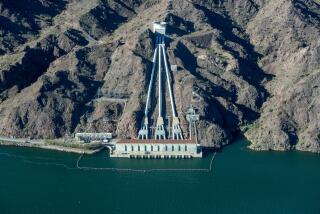Secession drive gathers steam in rural Colorado
- Share via
AULT, Colo. — Jennifer Weichel stood scowling behind the counter of her antique shop, in front of a life-size cutout of John Wayne, and fairly spat the word out: “Used!”
It’s how, she said, people in rural northern Colorado feel they’re treated by those in Denver and its sprawling suburbs, the ones with all the political power, who think milk comes from a carton and meat arrives magically shrink-wrapped inside the butcher case.
“They don’t even know who we are up here,” she said, her anger like the smoke curling from Wayne’s six-shooter. “We go completely unnoticed.”
Two doors down, Mayor Butch White agreed. “Legislation that’s passed is never in our favor,” he said inside his dusky tavern, the Pour House. “I don’t know if they think we’re slow up here for living the way we do. But lots of people are sick and tired of that.”
So tired that on Nov. 5, residents of 11 counties across rural Colorado will vote on a proposal to secede from the state and, advocates hope, take the first step toward throwing off new gun controls, green energy requirements and other laws imposed by Democrats in charge in Denver, the state capital 75 miles away.
It is unlikely, even the most ardent supporters concede, that the nation’s flag makers will be stitching on a 51st star any time soon. The hurdles to secession, which include the consent of Congress, are high enough that no state has successfully broken off since West Virginia in 1863 — though a great many movements have tried.
Today, secession efforts are afoot in western Maryland and Michigan’s Upper Peninsula. Earlier this month, supervisors in Northern California’s Siskiyou County endorsed a decades-old dream of merging with other rural counties and parts of southern Oregon to form the state of Jefferson.
In Colorado, local lawmakers have taken their disgruntlement a step further by putting the question to voters. And even if secession is an exceedingly long shot, backers say that at least the election has gotten the attention of people, including Democratic Gov. John Hickenlooper, and forced them to acknowledge the resentment simmering among rural residents.
“It forces a conversation in the state that needed to happen,” said Weld County Commissioner Mike Freeman, who grew up on a farm near Ault and voted with the rest of the five-member board to place the measure on November’s ballot. “It’s forced people to look at how unfair it really is.”
Much of the grievance is local in nature. Rural Colorado is farm country — Weld County is the eighth-largest agricultural producer in the nation in terms of market value — and a rich source of oil and natural gas. That yields enormous revenue for the state, officials say, most of which goes elsewhere. Roads are neglected, they complain, and schools are underfunded.
Even the recent floods that pummeled the area have provoked finger-pointing; some say they never would have happened, or been as bad, if environmentalists and their liberal allies hadn’t blocked construction of controversial water storage projects.
But in many ways, the secession movement is a backlash against broader changes that have spread across the West over the last two decades, as the region has grown more urban, more diverse and, not incidentally, more Democratic.
Few states have undergone the transformation that Colorado has experienced, as an influx of outsiders — many from California — have crowded into Denver and the mushrooming communities along the Rocky Mountain Front Range. The overwhelming majority of residents live in a cluster of urban counties near the center of the state, and that has shifted political power away from the far-flung corners of Colorado and diminished their conservative influence.
Up north, where the subdivisions taper off and the land and sky open up, residents unhappily note that Hickenlooper, who started a Denver brew pub before entering politics, and Colorado’s two U.S. senators, Michael Bennet and Mark Udall, all hail from that urban corridor.
No so long ago, said Weld County Commissioner Sean Conway, the state had politicians like Roy Romer, a former Democratic governor raised on a farm, and Wayne Allard, a Republican former U.S. senator who grew up on his family’s ranch. “They had a wider view of Colorado in its totality,” he said. “Today, we have the governor of Denver.”
Conway, a Republican, offered his bipartisan example to suggest that secession was not so much about party politics as the divide between rural and urban Colorado.
In fact, state Rep. Dave Young, a Democrat who represents Greeley, the Weld County seat and a city of about 100,000, said secession rarely came up when he talked with constituents. “I think we’re always better off when we work together,” said Young, who differs with Conway and the rest of the commissioners backing secession. “I’m a native Coloradan,” he said with a laugh. “I don’t want to leave the state.”
Susan Moriarty, a Republican who owns a breakfast and lunch cafe in Greeley, agreed. “That’s just ridiculous,” she said of the breakaway effort. “We’re the state of Colorado. Just because Weld County is mostly farming doesn’t mean we don’t have the same needs as Denver.”
But outside Greeley, with its strip malls and car dealerships and paved-over farmland, sentiments quickly shifted.
After seizing control of the Legislature last year, majority Democrats went on a spree, passing legislation expanding gay rights, boosting organized labor and providing driver’s licenses and in-state tuition to people in the country illegally. Most egregious, critics say, were adoption of stricter gun controls and the law requiring rural electricity providers to double their renewable energy sources by 2020.
Many here cheered the recent recall of two urban lawmakers from southern Colorado, one of them the president of the state Senate, in a campaign focused on the new gun laws, which include universal background checks and limits on the size of ammunition magazines.
“We’re not trying to leave Colorado. Colorado has left us,” said Jeffrey Hare, a software security consultant and spokesman for the 51st State Initiative, the group leading the secession campaign. “We’re trying to restore the state to its historical roots and context.”
Hickenlooper, who faces reelection next year, has offered a characteristically measured response.
“If this talk of a 51st state is about politics designed to divide us, it is destructive,” he said. “But if this is about sending a message, then I see our responsibility to lean in and do a better job of listening.”
Secession proponents want more, starting with repeal of the gun laws and rural energy requirements.
“We’re not crazy,” said Tom Gilley, an agricultural trader and president of the 51st State Initiative.
“We just want to be left alone,” Hare said.
More to Read
Sign up for Essential California
The most important California stories and recommendations in your inbox every morning.
You may occasionally receive promotional content from the Los Angeles Times.











